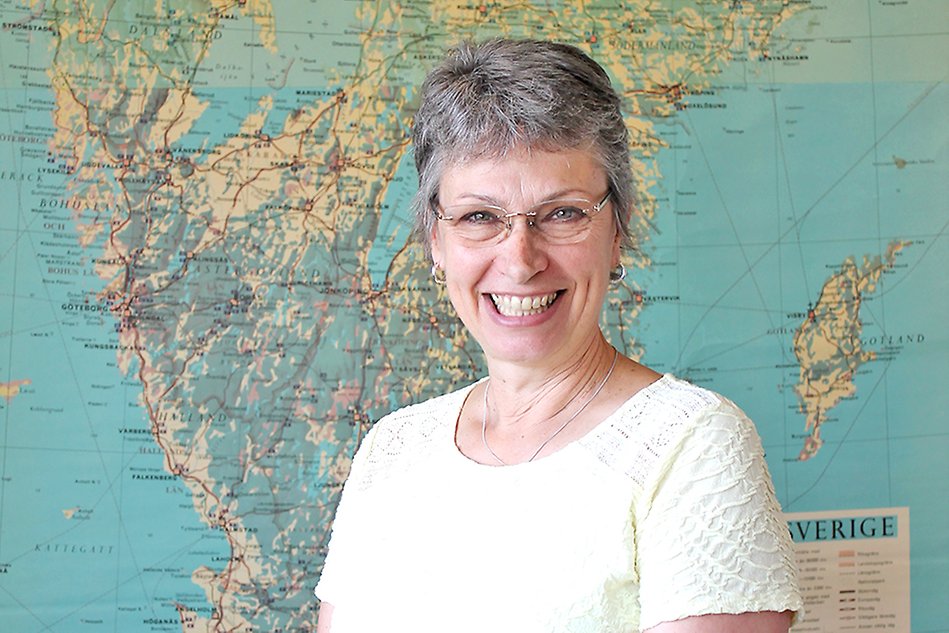How digital learning can enhance thinking
Does digital learning enhance our thinking? How? The term digital learning is under constant change and redefinition. After about 20 years of collaboration with Halmstad University, Jo Smedley is thrilled about the post as Visiting Professor in Digital Learning at Halmstad University. She focuses on a interdisciplinary approach and enhancing students employability – and holds a certain amount of scepticism towards digitalisation.
Digital learning is any type of learning that is accompanied by technology.
”Digital learning is an ever-changing term. What students are learning now will be redundant in 10 years. Hence why it’s so important to focus on the strategic elements of why and how digital learning can enhance thinking for future data, information and knowledge management. It’s this filtering approach that will enable Halmstad graduates to really enhance their employability – whether in education or business”, says Jo Smedley.
Jo Smedley started her academic career, about 35 years ago with a doctoral thesis in mathematics. Until August this year, she was a Professor of Learning Innovation at the University of South Wales in the UK, and director of the University’s distance education initiative, USW Online. Her retirement from full-time employment in the UK is enabling her to work with undiminished enthusiasm on different projects.

Jo Smedley has quite a history together with Halmstad University. She started coming here in 1999 as a Visiting Lecturer in Informatics at the University.
“It’s all about people”
The recruitment of Jo Smedley to Halmstad University, School of Education, Humanities and Social Sciences, is to strengthen and develop the School's research and education concerning digital learning. It is significant that a publication she is currently working on is called “Designing a learner journey: it’s all about people”.
”I’ve done a lot of work on learning per se and have now progressed this towards a business emphasis to see the impact peoples’ learning has, or can have, on their current or future organisations – irrespective of type.”
Her research focuses on personal and organisational change, empowered through efficient management of data, information and knowledge – particularly using appropriate technologies.
After her doctoral degree, she took a job at a Further Education college in the late 1980s, teaching information technology with the aim of getting a better understanding of teaching practical learners:
”I focused on future student employability. It was tough! I was on a steep learning curve during my first few years, teaching learners from different vocational groups for example carpenters and bricklayers. The impact needed to be quickly evident to highlight relevance for the students and gather support from colleagues. As I look back now, this entrepreneurial approach was exactly the right one to learn more about.”
The student-centred approach has continued at the heart of her learning and teaching in her University career in the UK and Europe.
”It has provided the impetus for me to continually reflect on learning and teaching styles to ensure that students employability is maximised.”
Multi-disciplinary approach
Jo Smedley publishes outcomes from her projects and developments at every opportunity. In a time-limited academic world where publications matter, it is, according to her, important to tell the “stories” of how the academics apply the learning to push forward knowledge boundaries.
”It took me some years of project working to fully realise that projects are always reflecting a multi-disciplinary approach. Projects have no respect for any academic structure, so it’s down to us – as academic thinkers, creative thinkers and innovators – to work together to enable appropriate knowledge to be shared to satisfy expected outcomes. Technology can enhance this but the key is to ensure that its use is appropriate and makes things easier”, she says.
”With an ever-increasing access to an indeterminant amount of information, it’s important that we maximise our learning and avoid getting overloaded.”
Working smarter
Technology also brings people and ideas together. Her way of being a Visiting Professor is mirroring what is going on in the business world, she says. It is about flexible thinking and maximising time spent together - working smarter together to achieve greater impact, not necessarily more working hours.
”When I’m in Halmstad, I’ll be hosting face-to-face workshops and working with small groups to support, encourage and enable various research communities, developments and enhancements across the School.”
When away from Halmstad, she will run small, online group workshops and discussions – a chance to practice working using various forms of collaborative technologies. Through focusing on current developments and areas of strength, researchers and teachers can push research and education forward together.
Jo Smedley has been visiting and working with staff at Halmstad University since 1999, for example acting as a Visiting Lecturer. She is very happy at the opportunity of being a Visiting Professor.
”This post enables me to return to leading and doing more research writing and teaching – both long held passions of mine”, she says.
”Staff at Halmstad University are really keen to collaborate. It is lovely coming here, I am absolutely thrilled.”
Text and photo: Kristina Rörström


